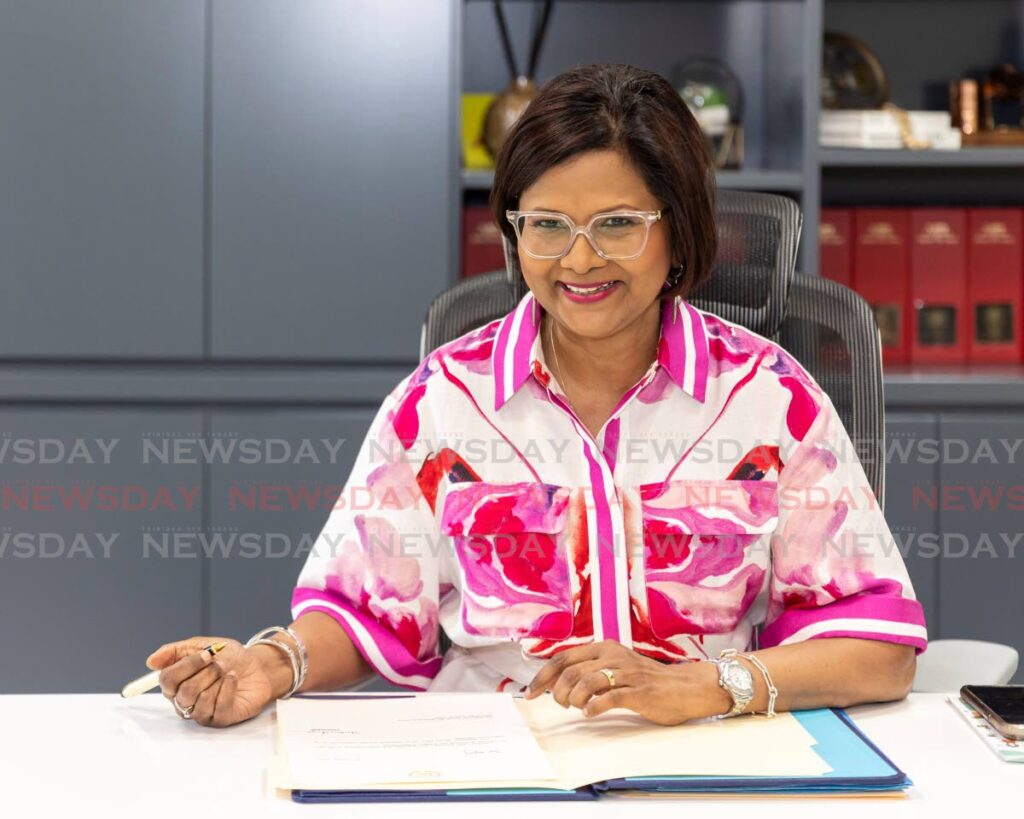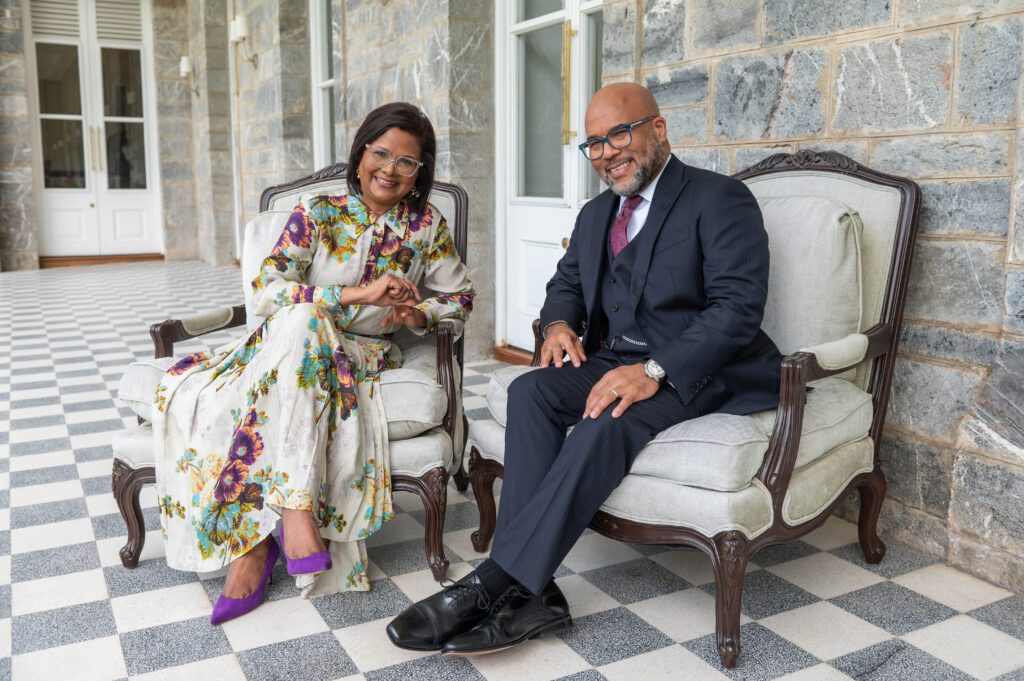President Kangaloo: Cancer made me stronger

TWENTY years ago, President Christine Carla Kangaloo came face to face with her mortality in the form of breast cancer.
And although getting rid of the invasive and unwelcome visitor came with a myriad of challenges, it also taught her life lessons she might not have learned otherwise.
“It did change my life," she said. "I would say it has strengthened me and made me deeply appreciative of life.
“It showed me that there was strength I had that I didn't know I had; it taught me resilience; it taught me to lean on other people,” which can sometimes be difficult for women who are not used to allowing other people to see their susceptibility.
“I don't like being vulnerable, and I don't like people seeing me vulnerable. I grew up like a little tomboy with my brothers, and having gone through what I did, I realised it's okay to be vulnerable.
“So I was able to rely on people, and let those close to me see that I wasn't okay all the time, and I opened myself up to the love they were all willing to give me.
"But those were some difficult lessons,” Kangaloo said in an interview with Newsday at President's House on October 8.
In March 2004, at 42, Kangaloo was diagnosed with Stage 2 receptor positive cancer – the type that allows cancer cells to use the hormone oestrogen to grow.
“I actually felt the lump in my breast and I immediately went to my ob/gyn and she was concerned, so she sent me to do a biopsy.”
The president said even while she was waiting for the report, she had a nagging feeling she was not going to be happy with the results.
“So when I received the news, I wasn't as shocked as I would have ordinarily have been.”
Immediately, she said, she and her husband, fellow attorney Kerwyn Garcia, asked the doctor about her treatment options and started to map out a plan of action.
“I didn't react in any sort of emotional way,” but her first thought was about letting her mother know what was happening.
Then a government senator and a minister in the Office of the Prime Minister, she reported to Parliament for duty, in spite of everything that was going on.
“I remember having to go to the Senate that day, but I needed to speak to my mother and tell her in person. I knew I needed to do it that day."
She asked permission of then leader of government business Dr Lenny Saith to leave early.
“He said ‘yes,’ and I headed straight down to San Fernando to meet with my mother.”
It was a difficult conversation to have, considering her mother had lost her younger daughter, 29-year-old Caryl, in a car crash in 1993.
“My mother is very stoic, but you could see the worry and emotion on her face when I told her.”
She then told her brothers about her diagnosis.
Kangaloo had a lumpectomy, followed by four rounds of chemotherapy, then radiation. Through it all, she said, her family and friends stayed by her side.
“I remember all my brothers and my husband gathering around me just as I was going into surgery and were waiting for me when I came out. They were all there, except one brother who stayed back with Mom at home. But my other brothers were calling to tell them exactly what was happening.”
Up to that point, she said, she had remained composed about the situation. The emotional rollercoaster kicked off when, after the surgery, she had to undergo some tests to determine whether or not the cancer had spread before she could go on to the next phase of her treatment.
“I remember waiting for the test results and that was when emotions started to play. 'If it had spread, what do I do?'
"We already knew it was cancer, just not how far. So the waiting and not knowing was difficult.”
Fortunately, the results were good, and about a month after the surgery she started chemo.
“It was brutal,” the president said. “I remember I would schedule the therapy for Saturday mornings and then rest for the rest of the day and on Sunday, because I was still determined that I had to be at work on Monday…
“At that time I was the minister responsible for social services delivery.”
The first round seemed to go in her favour, as it did not seem to affect her too much physically.
“I said, ‘Okay, I’m not feeling too bad.'
"By the second round, I started to feel ill, and the worst part was when my hair started to come out in clumps. Of course I had thought I could have willed my hair not to fall off,” she said with a chuckle. "But that didn't happen."
And of course, the nausea only complicated matters.
“There were some foods I couldn’t tolerate at all.”
Despite her attempts to keep a positive outlook during her treatment, Kangaloo said sometimes facing the reality was devastating.
“Your emotions are all over the place – you have bouts of sadness and fear, but then you pick up because you know you have to keep up with your treatments, because you know this is to ultimately get you better.”
Radiation was much easier on her, but the fatigue that brought on was a challenge in itself.
“Before I was diagnosed I used to go to the gym and exercise. I thought after the chemo and radiation I would be able to start exercising again, but I couldn’t.
“While doing radiation I was able to eat, because I didn't have the aversion to food that I had with chemo. But I was always extremely tired.”
An exhausted Kangaloo, though, was determined that the effects of her treatment would not affect her work, which became a coping mechanism of sorts.
“I rested on the days I could and work was a focal point that helped prevent me from getting over emotional with what I was going through.
“I had a very demanding ministry, so there was a lot required to be done. When I look back I wondered how I was able to do it. With the grace of God, I say.”
Her treatment was done at both private facilities and at the St James Radiology Centre.

And although her meds played a pivotal role in her healing process, Kangaloo believes her support network was “a form of healing,” without which she’s not sure how she would have got through that very difficult time.
“My mother, she made sure that whatever I wanted to eat, she would cook and send for me.
“My husband was with me every step of the way – for every chemo session he was there.
"My brothers stepped in to help in whatever way, my friends as well. I got so much emotional and tangible support and I thank God for that.”
The president said her heart goes out to women who may not have that type of network and is happy that some NGOs like the TT Cancer Society (TTCS) – of which she is patron – offer some assistance.
“It was a no-brainer when they (the TTCS) reached out to me to be its patron.
"The fact that there are women who may not have the support of family and friends, and that an organisation allows them to feel that connection and to get the help they need – I thought it was very important, because of my experiences, to align myself with the Cancer Society. I am very proud to be the patron.”
Kangaloo ensures she keeps up with her screenings, and although she is always mindful of the possibility that the cancer could return, even after 20 years, she has long let go of the fear with which she was obsessed.
“That is how life is – there is joy and sorrow. I am grateful that all has been well with me. I can't speak for every cancer survivor, but I think there is always that concern that something could happen.
“I remember initially, after my treatment had finished, being concerned and being openly focused on tests, reminding myself, 'I have to take this test in six months or a year,' to let me know that everything is fine.
"And that is something I've had to let go; that fear. There is always a concern that something may happen, but I try very hard to live in the mindset that I'm doing all that I can do, and just leave it at that.”
She advises women to be aware of their health and get screened, because early detection increases the odds of a better outcome.
To those who have already been diagnosed with cancer, Kangaloo said as difficult as it is, they should avoid living in fear, especially if their cancer was detected early.
“I wasted many years living in fear...It took a long time for that emotional healing, and I am not going to let fear of cancer coming back dominate how I live.”
She urges these women to be aware of and educated about what is happening to them and to focus on their medical plan of action.
“Take the advice from your doctors, and not people who come to tell you, ‘Do this,’ and, ‘Don’t eat that.’”
And to the ‘village’ that holds these women’s heads above water, the president said, “Be there for them, but take the lead from them. Don't overwhelm them with all your concerns. What the patient needs, let them ask you for it.
"Just let them know that you are there for them unconditionally."
Editor's note: As part of the campaign to observe Breast Cancer Awareness Month, Newsday is publishing several stories about cancer survivors, tips on how people with cancer can cope and other breast-cancer-related stories. Read more in our Breast Cancer Awareness special publication here.

Comments
"President Kangaloo: Cancer made me stronger"